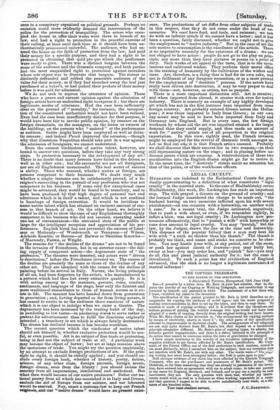LEGAL CRUELTY.
HUSBANDS are indebted to the Ecclesiastical Courts for gra- dually approximating to a definition of what constitutes "legal cruelty" in the married state. In the case of Bialbablotzky versus Bialbablotzky, this week, Dr. Lushington has made an important step. The wife prayed a divorce on the ground of cruelty ; and the learned Judge considered the charge to be made out, "the husband having on two occasions inflicted upon his wife severe punishment—on one occasion with a horsewhip, on another with a cane." In a recent trial, the Judge intimated, negatively, that to push a wife about, or even, if We remember rightly, to inflict a blow, was not legal cruelty; Dr. Lushington now pro- nounces affirmatively, that to "punish a wife" with horsewhip or cane does amount to legal cruelty. You may "punish," but the law, by the Judges, draws the line at the cane and horsewhip. This disposes of the popular fallacy that a man may beat his wife with " a stick no thicker than his thumb." The thumb is probably too thick, and canes and sticks we conceive to be obso- lete. You may hustle your wife, at any period, out of the room, or push her against chests of drawers—you may bully her, swear at her—you may order her, and "punish" her—you may do all this and plead judicial authority for it: but the cane is interdicted. To such a point has the civilization of England advanced, that the stick is no longer a legitimate instrument of marital influence
























 Previous page
Previous page